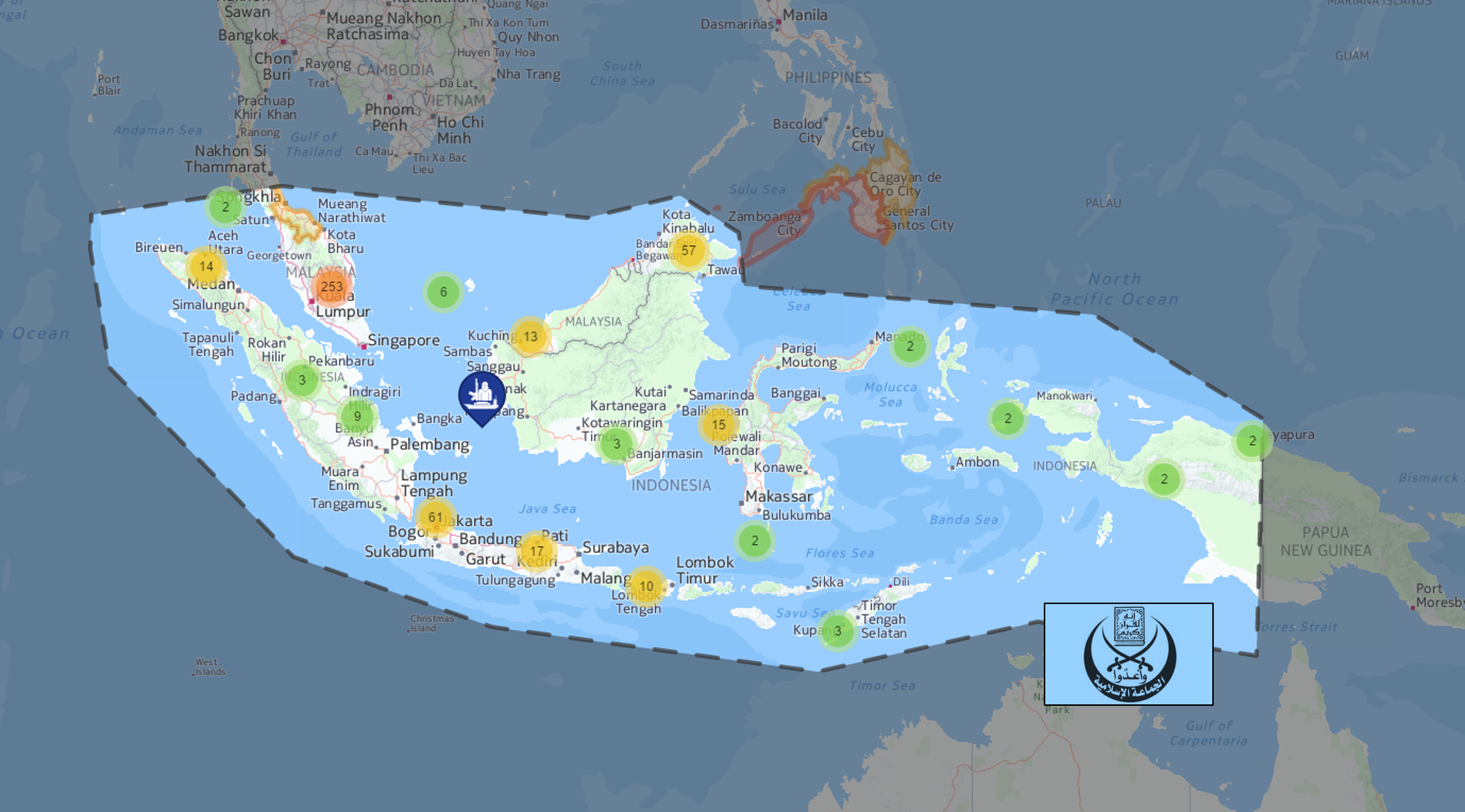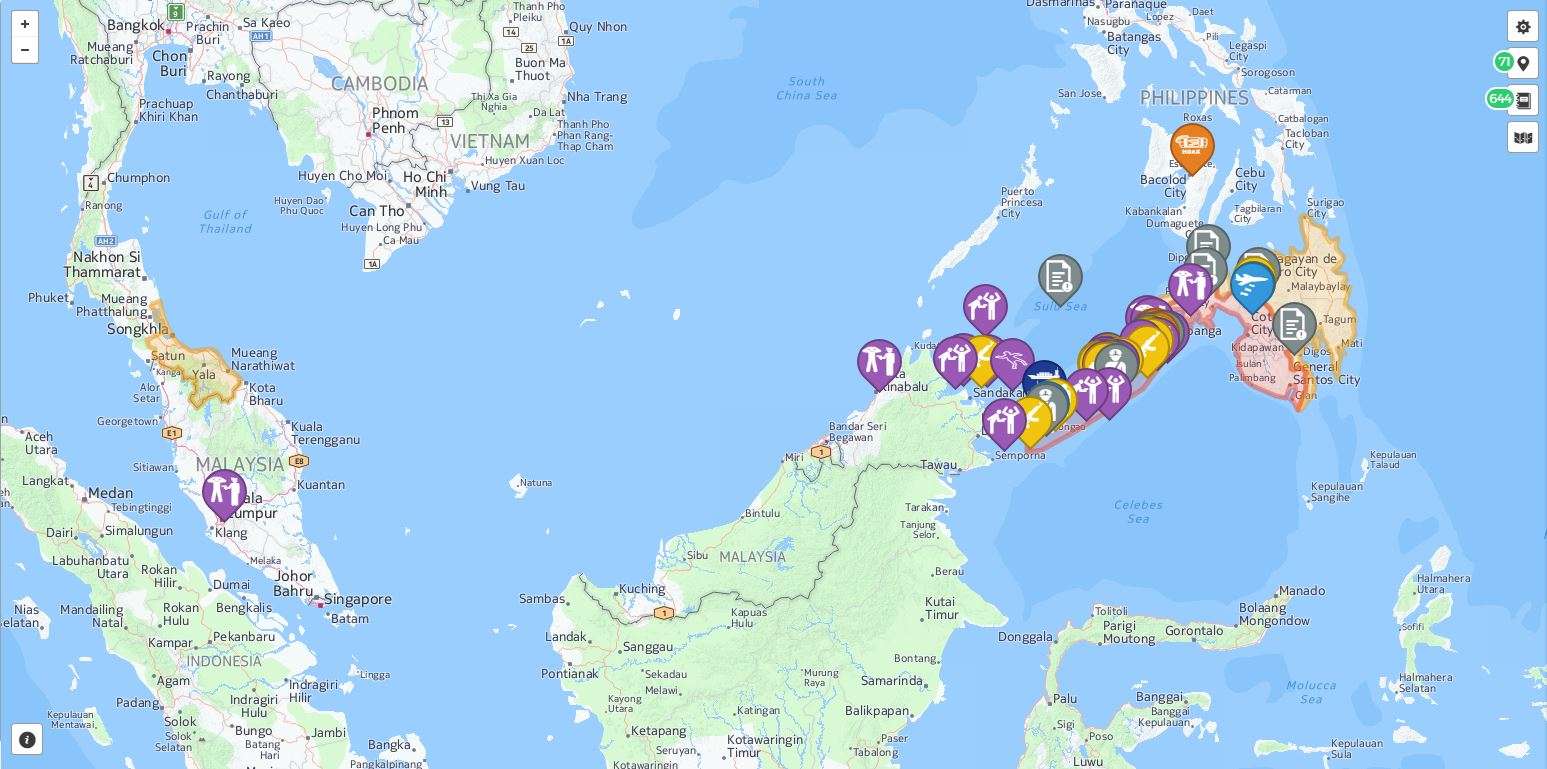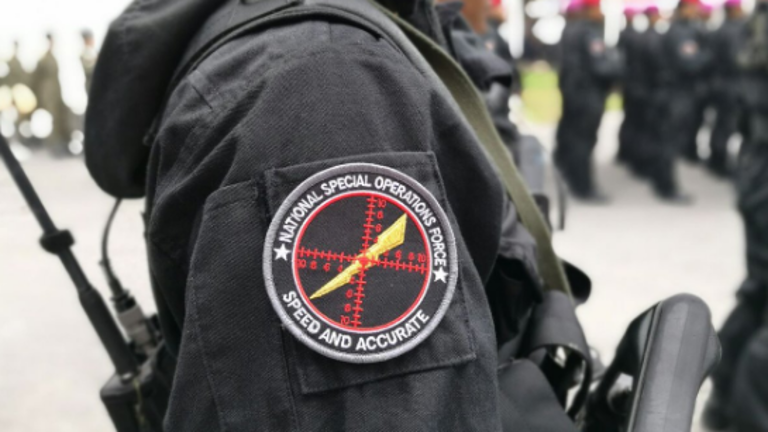The Threat of the Islamic State in South-East Asia, and the Counter-Terrorism Unit on the Frontlines in Indonesia
The Threat in South-East Asia
While the threat of foreign born Islamic State fighters returning to their countries of origin has been concentrated on those from Western Europe, a substantial threat is also present for those originally from South-East Asian countries such as Indonesia, Malaysia, and the Philippines. Additionally, the threat includes Islamic State inspired attacks perpetrated by nationals that have been radicalized or members of local terror groups. The threat is not only present, but has already been acted upon. On January 14th, 2016, the capital of Indonesia, Jakarta, was rocked by gunfire and explosions from four gunmen. The day ended with four civilian casualties, dozens more injured, and the death of all four gunmen. This was the first major attack in Indonesia in six years, and represented the first attack by the Islamic State in Indonesia.
It was not the first-time Indonesia has been hit by terror attacks, as they have been dealing with attacks from Al-Qaeda linked group Jemaah Islamiyah (JI) before, but it showed that the West was not the only place ISIS were looking to undertake attacks. In June of the same year, the Islamic State released a video with three South-East Asian combatants from Indonesia, Malaysia, and the Philippines, urging citizens of their own countries to join the Jihad in Syria and Iraq, or to reach the southern Philippines and fight there. The threat is not only from those already in country, but from the potential fighters returning from Syria and Iraq.

Area where Jeemah Islamiyah have a presence.
While in 2013, the number of Indonesians fighting in Syria was estimated at 50, that number grew to between 300 and 700 in 2016 and early 2017. One such Indonesian, who was the commander of South-East Asian militants in the ranks of the Islamic State, was killed after the explosives-filled car he was driving towards Syrian Army troops in Palmyra detonated prematurely on March 13th, 2017. Indonesians engaged in fighting in Syria and Iraq pose a threat to their homeland and South-East Asia through the possibility of returning and perpetrating attacks as small terror cells or lone wolves; and by recruiting and radicalizing the next wave of Indonesian terrorists to join attacks at home or in the southern Philippines. In October 2016, Indonesiaâs National Counter-Terrorism Agency said that at least 53 Indonesians had come back to Indonesia from Syria after having joined the Islamic State, and that they were looking for recruits. Of those 53, it was said, the threat was not only from those already able to fight, but it also comes from the children that were brought along, that are very influential and may have been radicalized. It is therefore important for the authorities to reach those children quickly to de-radicalize them.
Additionally, the role of women in terror activities is increasing, as groups are now more willing to give them a fighting role rather just as wives, mothers and teachers. Women attract less attention and therefore can reach targets more easily. In 2016, two women were arrested after having used encrypted messaging services to plot the bombing of presidential palace in Jakarta. It is not uncommon for women to be recruited for illegal activities. Drug traffickers have used women foreign-workers before to smuggle drugs into countries, as they are more vulnerable to be persuaded to perform such activities.
The threat of ISIS in South-East Asia has been acknowledged by many regional powers. In January 2017, the Defense Secretary of the Philippines announced that intelligence showed that the leader of Abu Sayyaf in the Philippines, on the command of the Islamic State, was exploring possibilities of expanding outside its normal realm of operations in Basilan, Sulu, and Tawi-Tawi, into areas of Mindanao. In March, Australiaâs Foreign Minister expressed a similar sentiment that the Islamic State may declare a Caliphate in Mindanao, as their grip in the Middle East has been waning, particularly with the current offensive in Mosul, Iraq. These statements reinforce the fear of returning fighters to the region to perpetrate attacks. The possibility of militants travelling between Indonesia, Malaysia, towards Mindanao in the Philippines, was confirmed in the early months of 2017.

Abu Sayyaf related incidents on Intelligence Fusion.
In early January, Malaysian authorities launched a manhunt for a former university lecturer turned militant, accused of recruiting fighters in the region. It is thought he took the sea route in Tawau, Sabah to reach the southern Philippines. A couple months later, it was reported that an immigration officer working at the Sandakan airport in Malaysia had been secretly accepting payment to secure safe passage for Islamic State militants from Indonesia to the Philippines. As of now, she is known to have helped three militants. In the same month, others were arrested including one ferry ticket-seller, for having assisted in the process of smuggling militants across borders. The threat of attacks in South East Asia is not only present, but has already been acted upon, and has led to regional powers to work together to ensure the safety of all in the region against future acts.
What Have Countries in the Region Done?
There are already numerous military alliances established within the region, but additional steps have been taken in recent months to strengthen national or regional agreements to fight the threat of the Islamic State. In October 2016, Malaysia launched the National Special Operations Force (NSOF), as the lead agency to battle the threat of terrorism. The unit is comprised of personnel from the armed forces, police, and the Malaysian maritime enforcement agency. It is in place to act as the first responder to any terror situation in the country, and it was created in direct relation to the threat posed by the Islamic State.

NSOF
Australia, as one of the most powerful countries in the region, has also been active in establishing stronger relations in the fight against the Islamic State. Both themselves and Indonesia have pledged to work together to stem the funding of terrorist activities, by working on developing a common understanding on how to locate the source of the funding, and how to dismantle the funding networks. In March of this year, Malaysia and Australia met and agreed to empower the âFive Power Defense Agreementâ, made up of both countries plus Britain, New Zealand and Singapore, by pooling resources and strengthening their military defenses.
Who are Densus 88?
In 2016, police in Indonesia killed 33 people and arrested 170 for foiled attempts to launch attacks, which represents a significant increase from the previous year. The quarter of 2017 has already seen multiple arrests and counter-terror raids undertaken in Indonesia, foiling multiple plots. The unit in charge of these arrests and raids is Detasemen Khusus 88, or Densus 88, a group formed with the sole purpose of hunting down various terrorist elements in Indonesia, to ensure a repeat of previous attacks does not happen.

Created in response to the 2002 Bali bombings, the group is comprised of 400-500 members, led by a core 30 senior members, whom many hold doctorates in field such as psychology and social behavior. The majority of Densus 88 is made up of members dedicated to gathering intelligence in the field, and monitoring online activities. Much of this intelligence gathering is done online, by infiltrating and monitoring chat rooms, social media, and messaging apps popular among militants due to amount of applications allowing for the encryption of messages. There is also a large team within the unit focused on analyzing the intelligence gathered in the field, as well as examining any evidence gathered, including explosives. The members most visible, are the ones carrying out the raids dressed in all black and heavily armed, yet make up only a small proportion of the unit.
The groupâs success comes from its elite training and methods, sometimes questionable, made possible by the bankrolling of the unit by the U.S. and Australian governments, two of the backers. After the attacks of September 11th in the United States, and the declaration of the war on terror, an enormous amount of funding was made available to countries establishing units such as Densus 88, by countries like the U.S.
The unit has been used for other activities not related to raiding potential terrorist safe houses, such as being deployed in Jakarta during the 313 rally. The rally, staged by the Muslim Forum, is similar to previous rallies in recent months demanding the Governor of Jakarta, Basuki âAhokâ Tjahaja be impeached for having insulted Islam. The Unit was deployed to ensure early detection of terrorist threats.
Islamic Militant Activity in Indonesia
Since January 2016, when the Jakarta attack took place, the first Islamic State responsible attack in Indonesia, security operations have been ongoing to prevent more attacks of the kind. In the first few months of this year, multiple raids have already been undertaken resulting in the arrests and sometimes death of militants of home-grown terrorist groups with affiliations to the Islamic State. Indonesian citizens have also been arrested at airports returning from Turkey or Syria, after having allegedly attempted to join the Islamic State in Syria. The events that have taken place so far this year in Indonesia include:
January 21st- 17 Indonesians were arrested at the Soekarno-Hatta airport in Jakarta after their flight landed from Turkey. They were returning from Syria and were suspected of radical activity. Among them were 2 young children.January 25th- Indonesian police detained a former finance ministry official, his wife and three children, after they landed from a flight from Turkey to Bali. The man and his family had been deported by Turkey after having attempted to cross the border into Syria, on suspicion of wanting to join the Islamic State.January 30th-31st- Densus 88 arrested three alleged terrorists in three separate locations in Central Java.February 27th- Homemade bomb was detonated by two terrorism suspects in Bandung, the capital of West Java. No one was hurt in the explosion, which involved a pressure cooker filled with nails. One of the terrorist, fled to a nearby office building, setting a fire and continuing to throw improvised explosive devices towards the police before being shot and taken into custody. The two are believed to be part of Jamaah Ansharut Daulah (JAD), a group linked to the January 2016 Islamic-State inspired attack in Jakarta. On March 13th, two suspects believed to have funded the attack were arrested, and equipment for other improvised explosive devices were seized.In March, it was reported that a new terror group was operating in Central Sulawesi, Indonesia, in an area that was home to the East Indonesia Mujahidin (MIT) terrorist group. A security operation has been ongoing in the region to counter any threat from the group.On March 10th, 2017, Densus 88 counterterrorism squad arrested 7 suspected terrorists in Tolitoli, Central Sulawesi, foiling their plot to attack a police office in Poso. A search of the premises found bomb-making materials such as fertilizer, sulfur, charcoal, nails and methylated.On March 24th, security personnel from Densus 88 searched the house of one of the 8 suspected terrorists arrested a day earlier in several areas of Banten, while another suspect was killed by security forces after he shot at them. Documents were retrieved from the house to support the case that the suspects were planning terrorist acts.April 7th- Densus 88 arrested three terrorism suspects allegedly affiliated to the Jamaah Anshar Daulah, the home-grown terrorist group affiliated with the Islamic State, in Lamongan, East Java. They had allegedly planned to attack the Brondong police sub-district in Lamongan. One of those arrested had received military training in the southern Philippines, and had also bought weapons from there, two of which were used in the attacks perpetrated in Jakarta in 2016.April 8th- Members of Densus 88 arrested an Indonesian citizen at the Juanda International Airport in Surabaya, East Java, for links to the Islamic State.April 8th- A failed drive-by on police officers in East Java by suspected members of an Islamic militant group, police gave chase. The 6 suspects abandoned their car in a village in an area near Tuban, and engaged police in a firefight in a nearby plantation. All 6 suspects were shot dead. The suspects and their vehicle was being monitored by police after arrests made by Densus 88 on April 7th.
These incidents do not include the many other arrests made in Malaysia and the Philippines, of citizens having links to the Islamic State. Several terror plots have been foiled since the start of 2017 in both these countries as well.
Analysis
Indonesia has so far done well to curb major attacks, particularly since 2016. The recent attack in Bandung on February 27th, was probably the most important in terms of potential for injuries, that has occurred since 2016, and it was fortunate that no one was hurt. While Indonesian counter-terror units have done well in stopping militants plotting to attack targets in Indonesia, an attack on the scale of January 2016, if not bigger, will likely occur at some point in 2017. The trend of events in the first quarter of 2017, have shown that terror groups affiliated to the Islamic State, or even unaffiliated, have been quite active. Additionally, the Islamic State losing ground in Iraq and Syria, and their communication with terror groups in the southern Philippines to establish a Caliphate in Mindanao for the Jihad to continue from there, will continue to have impacts on the region. Returning fighters are a real possibility, and the fluidity with which some have moved between Malaysia, Indonesia, and the Philippines to reach areas considered safe havens, should be worrisome for all regional powers. Finally, Indonesia, will need to continue de-radicalization programs in their prisons, to ensure that those entering prisons to not come out with a new ideology geared towards hate and destruction. Indonesia, a majority Muslim country, has run its country in a secular fashion for a long time, but recent protests by Muslim groups against the Christian Governor of Jakarta, for his alleged insult to Islam, have shown that a shift may be occurring in the country with more extreme elements gaining traction. This could lead to future problems, for which Densus 88 may be well suited to counter.
Funding for the unit will continue to come, particularly due to its impressive record of arrests of militants, and the work done to curb the activities of home-grown terrorist groups in Indonesia. This record will likely overshadow any complaints that have come about certain tactics which may violate human rights. In an age where terrorist groups employ more varied tactics and weaponry, and where lone-wolf attacks become more frequent, the activities of counter-terror units will not be as scrutinized if these same activities continue to show results in stopping future attacks. Funding is unlikely to be cut. Additionally, regional powers, will continue to work together to stop terrorist funding, movement, and plots, through shared intelligence, training, and equipment. The Islamic State must be contained, and units such as Densus 88 are key to do so.
